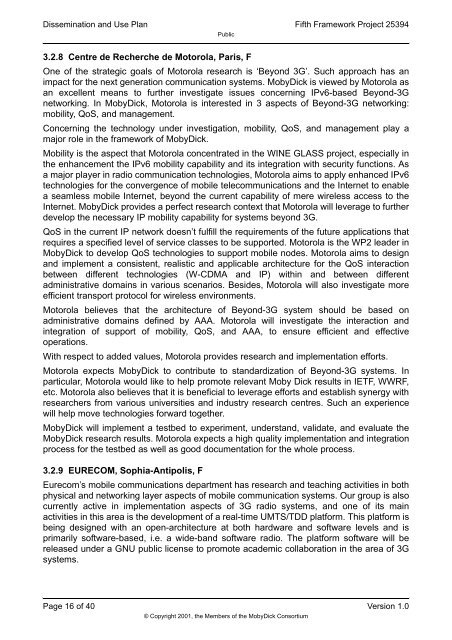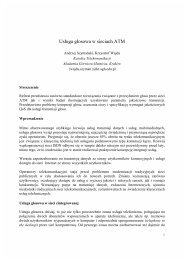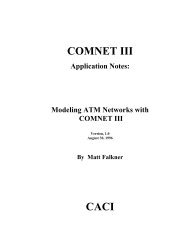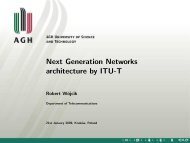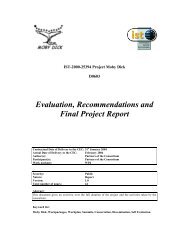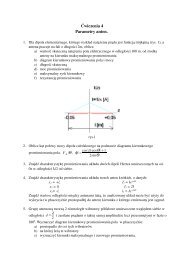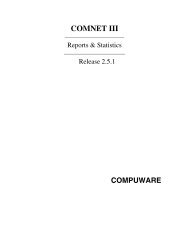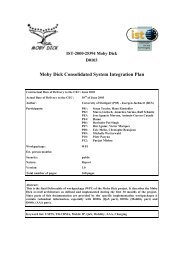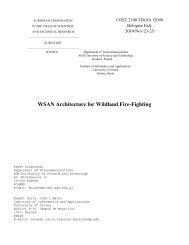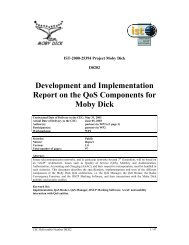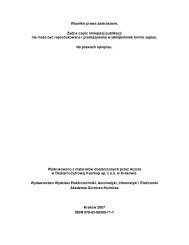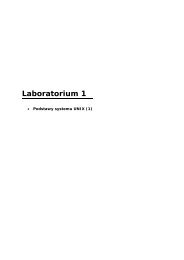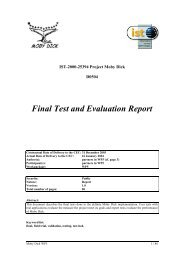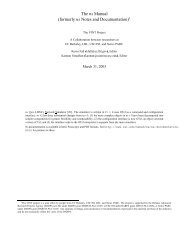IST-2000-25394 Moby Dick D0601 Dissemination and Use Plan
IST-2000-25394 Moby Dick D0601 Dissemination and Use Plan
IST-2000-25394 Moby Dick D0601 Dissemination and Use Plan
Create successful ePaper yourself
Turn your PDF publications into a flip-book with our unique Google optimized e-Paper software.
<strong>Dissemination</strong> <strong>and</strong> <strong>Use</strong> <strong>Plan</strong> Fifth Framework Project <strong>25394</strong><br />
Public<br />
3.2.8 Centre de Recherche de Motorola, Paris, F<br />
One of the strategic goals of Motorola research is ‘Beyond 3G’. Such approach has an<br />
impact for the next generation communication systems. <strong>Moby</strong><strong>Dick</strong> is viewed by Motorola as<br />
an excellent means to further investigate issues concerning IPv6-based Beyond-3G<br />
networking. In <strong>Moby</strong><strong>Dick</strong>, Motorola is interested in 3 aspects of Beyond-3G networking:<br />
mobility, QoS, <strong>and</strong> management.<br />
Concerning the technology under investigation, mobility, QoS, <strong>and</strong> management play a<br />
major role in the framework of <strong>Moby</strong><strong>Dick</strong>.<br />
Mobility is the aspect that Motorola concentrated in the WINE GLASS project, especially in<br />
the enhancement the IPv6 mobility capability <strong>and</strong> its integration with security functions. As<br />
a major player in radio communication technologies, Motorola aims to apply enhanced IPv6<br />
technologies for the convergence of mobile telecommunications <strong>and</strong> the Internet to enable<br />
a seamless mobile Internet, beyond the current capability of mere wireless access to the<br />
Internet. <strong>Moby</strong><strong>Dick</strong> provides a perfect research context that Motorola will leverage to further<br />
develop the necessary IP mobility capability for systems beyond 3G.<br />
QoS in the current IP network doesn’t fulfill the requirements of the future applications that<br />
requires a specified level of service classes to be supported. Motorola is the WP2 leader in<br />
<strong>Moby</strong><strong>Dick</strong> to develop QoS technologies to support mobile nodes. Motorola aims to design<br />
<strong>and</strong> implement a consistent, realistic <strong>and</strong> applicable architecture for the QoS interaction<br />
between different technologies (W-CDMA <strong>and</strong> IP) within <strong>and</strong> between different<br />
administrative domains in various scenarios. Besides, Motorola will also investigate more<br />
efficient transport protocol for wireless environments.<br />
Motorola believes that the architecture of Beyond-3G system should be based on<br />
administrative domains defined by AAA. Motorola will investigate the interaction <strong>and</strong><br />
integration of support of mobility, QoS, <strong>and</strong> AAA, to ensure efficient <strong>and</strong> effective<br />
operations.<br />
With respect to added values, Motorola provides research <strong>and</strong> implementation efforts.<br />
Motorola expects <strong>Moby</strong><strong>Dick</strong> to contribute to st<strong>and</strong>ardization of Beyond-3G systems. In<br />
particular, Motorola would like to help promote relevant <strong>Moby</strong> <strong>Dick</strong> results in IETF, WWRF,<br />
etc. Motorola also believes that it is beneficial to leverage efforts <strong>and</strong> establish synergy with<br />
researchers from various universities <strong>and</strong> industry research centres. Such an experience<br />
will help move technologies forward together.<br />
<strong>Moby</strong><strong>Dick</strong> will implement a testbed to experiment, underst<strong>and</strong>, validate, <strong>and</strong> evaluate the<br />
<strong>Moby</strong><strong>Dick</strong> research results. Motorola expects a high quality implementation <strong>and</strong> integration<br />
process for the testbed as well as good documentation for the whole process.<br />
3.2.9 EURECOM, Sophia-Antipolis, F<br />
Eurecom’s mobile communications department has research <strong>and</strong> teaching activities in both<br />
physical <strong>and</strong> networking layer aspects of mobile communication systems. Our group is also<br />
currently active in implementation aspects of 3G radio systems, <strong>and</strong> one of its main<br />
activities in this area is the development of a real-time UMTS/TDD platform. This platform is<br />
being designed with an open-architecture at both hardware <strong>and</strong> software levels <strong>and</strong> is<br />
primarily software-based, i.e. a wide-b<strong>and</strong> software radio. The platform software will be<br />
released under a GNU public license to promote academic collaboration in the area of 3G<br />
systems.<br />
Page 16 of 40 Version 1.0<br />
© Copyright 2001, the Members of the <strong>Moby</strong><strong>Dick</strong> Consortium


